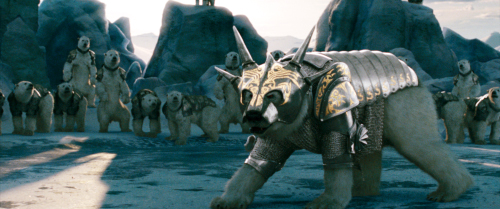Reviews
![]()
Golden Compass Disappoints Fans, Pisses Off Children
By Jack Baur
The most remarkable scene I viewed at the screening of The Golden Compass (the film adaptation of the first book in author Phillip Pullman’s His Dark Materials trilogy) occurred not during the feature itself, but during the closing credits. While the requisite terrible song played over the scrolling names,1 a row of indignant 12 year-olds in front of me leapt to their feet.
“THAT’S not how it’s supposed to be!!”
“WHAT did they think they were DOING?!”
It seems that these kids didn’t feel as if the film lived up to their visions of Pullman’s fantasy series, and frankly they weren’t alone.

The reasons for Compass’ downfall are as tragic as they are common. When fishing around for new science-fiction or fantasy franchises, Hollywood often looks to literature for works that are beloved for their sparkling individuality, offbeat sensibilities, and unique stories. However, Hollywood has never excelled in creating things that are individual, offbeat, or unique, preferring instead the homogenous and these films almost invariably suffer because of it. I imagine the original works as balls of dough, all uneven surfaces and odd angles, rolled out flat and pushed into square molds with all of the edges cut away. The results are movies with plots that resemble the original books, but possess little of the spark that made the books great in the first place.
The Golden Compass is no exception. Despite its excellent cast (nabbing Nicole Kidman to play the nefarious Mrs. Coulter was a particular coup) and high production values (everything from airships to armored bears look fantastic), the film lacks any sense of cohesion, intelligence, wonder, or soul. The screenplay spends all of its time recreating scenes from the book and none of it developing characters or building the world of the story. The characters remain distant and inscrutable, relationships between them hardly exist, and the sets, which are beautiful, are only backdrops to the action and not a world that we ever feel is real and lived-in. Remarkably, every plot point from the book is covered, but the film is so busy rushing its characters from scene to scene that the audience has a hard time figuring out what is going on and is left with the feeling that, even though they have watched two packed hours of film, nothing has actually happened.
The failures of this film didn’t surprise me in the least. Pullman’s books are deep, dark and troubling as young adult fantasy goes, presenting a critique of a societies in which religious forces are given authoritarian power, ultimately arguing for an individualized sense of spirituality and a skeptical approach to dogma.2 In the books The Magesterium, a religious institution that has gained political control, is proven to be in the service of a false god who enslaves the spirits of his followers in the afterlife. In an attempt to quell potential backlash from religious groups,3 the filmmakers have stripped most of the religious content from The Golden Compass by making The Magestarium a strictly political body, and with this move have managed to not only de-fang the critique but also upset all the inner-sense of the story, leaving an all but incomprehensible mess. I saw this movie with two people who had not read the books, and I asked them afterwards they had been able to follow it at all. Their response was that, while watching, they knew that something was supposed to be making some kind of sense, but they couldn’t figure out what it was.
Still, there was one place where I knew this movie wouldn’t dare disappoint me: fighting bears. The character Iorek Byrnison, a giant armored bear voiced in the film by Ian McKellan,4 if not as fully developed as he is in the book, is still every bit as noble, powerful, frightening, and loving as he should be. What’s more, his battle with Iofur Raknison, the bear that has taken the throne of the arctic bear kingdom from him, is the only exciting moment of the film.
That right there is as good an assessment of the current state of Hollywood as any: though it may fail in delivering thoughtful commentary on human spirituality, it will never let you down when it comes to the kind of ferocious violence that can only occur between giant armored bears.
1 WHY must fantasy epics always end with terrible songs? See Stardust, The Princess Bride, and all of the Lord of the Rings movies, for examples of great movies with dreadful ending songs. In fact, he only one I can think of that doesn’t suffer this fate is Labyrinth, but that movie has the power of David Bowie behind it, so that doesn’t really count.
2 For an excellent look at the religious themes of “His Dark Materials,” see Donna Freitas’s piece, “God in the Dust, here.
3 This attempt hasn’t had much success and many religious groups are still up-in-arms over the film’s release, encouraging boycotts of the film. It never fails to amuse me when any group, religious or political, responds to accusations that they are narrow-minded and controlling through narrow-minded backlash and attempts to control the thoughts of their flock.
4 What self-respecting fantasy epic these days would be complete without Ian McKellan?
January 11,
2008
Vol. XII Issue 2

iServe’s iKnit program collected: 13 hats, 4 scarves, 4 bags of toiletries/sundries Silverfish’s DAWN House drive collected:
$160 in gift cards, 6 toys, 4 coloring pads, 3 sets of art supplies, 3 board/card games, 3 pots and pans, 1 kitchen set, 2 books, 1 watch, 1 coffee maker, 1 roll of wrapping paper, and an unspecified amount of candy

Top 5
- National socialism and soccer
- Orangeries--Italy
- Anti-estrogenic diet
- Deviant behavior in rabbinical literature
- Milk ducts
Find better ones?
Add them to the blog


